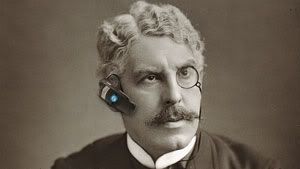This post was written by Matthew Lasar and originally featured on ArsTechnica.
Not long ago I was out of town, sitting in an unfamiliar neighborhood cafe and talking with a buddy on my mobile phone. Quick as a text message, the proprietor rushed in and pointed to a sign over the door forbidding such activities in her establishment. I obediently nodded, said my goodbyes, and shut the device down.
I then spent the next fifteen minutes listening to a couple at the adjacent table have a loud argument, about which the owner said nothing. Still, I try to be accommodating in these situations. It makes no sense to argue with folks about this stuff. Once people get it in their heads that checking tomorrow's weather on your iPhone or Android device at the table is rude, it just is—until the day that it isn't any more. But since everybody's debating the appropriateness of cell phones and laptops in restaurants and cafes, it's worth remembering that our attitudes towards communications gadgets change constantly. One way to get a sense of that is to read Claude S. Fischer's wonderful tome, America Calling: A Social History of the Telephone to 1940.

The Telephone Pledge
From the late-19th through the early 20th-century, the telephone was the communications tool of the well-off and the middle class, Fischer notes. "Besides those with business reasons, it was the social elite who subscribed in 1900," his survey of three northern California towns concluded. Doctors, lawyers, local storekeepers—these represented the Bell System's core market. They were often the only people who could afford to lease the service. When blue collar households had to decide between a phone or a Model-T Ford, they often chose the latter. Although innovations like party lines and rural co-ops gradually expanded telephony to rural and urban working class consumers, by the early 1930s much of this progress was undone by the Depression. Between 1930 and 1933, over 2.5 million Americans dropped telephone service. The nationwide subscription rate fell by ten percent, to less than a third of the total household market. Within this context, AT&T publicists took pains to portray the telephone as a respectable, middle class gadget, to be used politely and responsibly. Bell Telephone franchise ads constantly railed against rude or argumentative behavior over the receiver, as in a 1910 notice with the headline "Dr. Jekyll and Mr. Hyde at the Telephone." "The marvelous growth of the Bell System has made use of the telephone universal and misuse a matter of public concern," the ad warned. Some local phone companies even pushed for, and won, city laws making profanity in phone conversation a finable or jailable offense.
AT&T went so far as to send out a card titled "The Telephone Pledge." "I believe in the Golden Rule and will try to be as Courteous and Considerate over the Telephone as if Face to Face," it required consumers to declare.
Continue to read the full post from ArsTechnica here.
